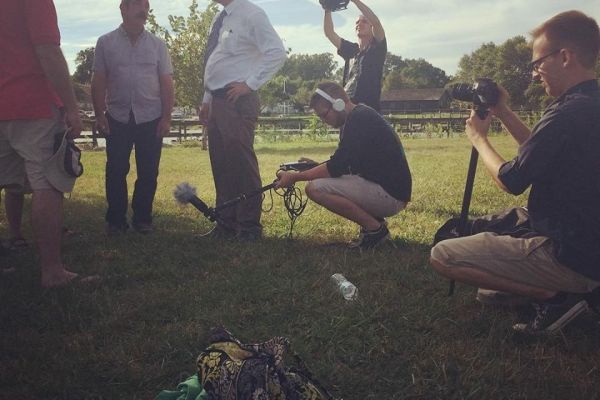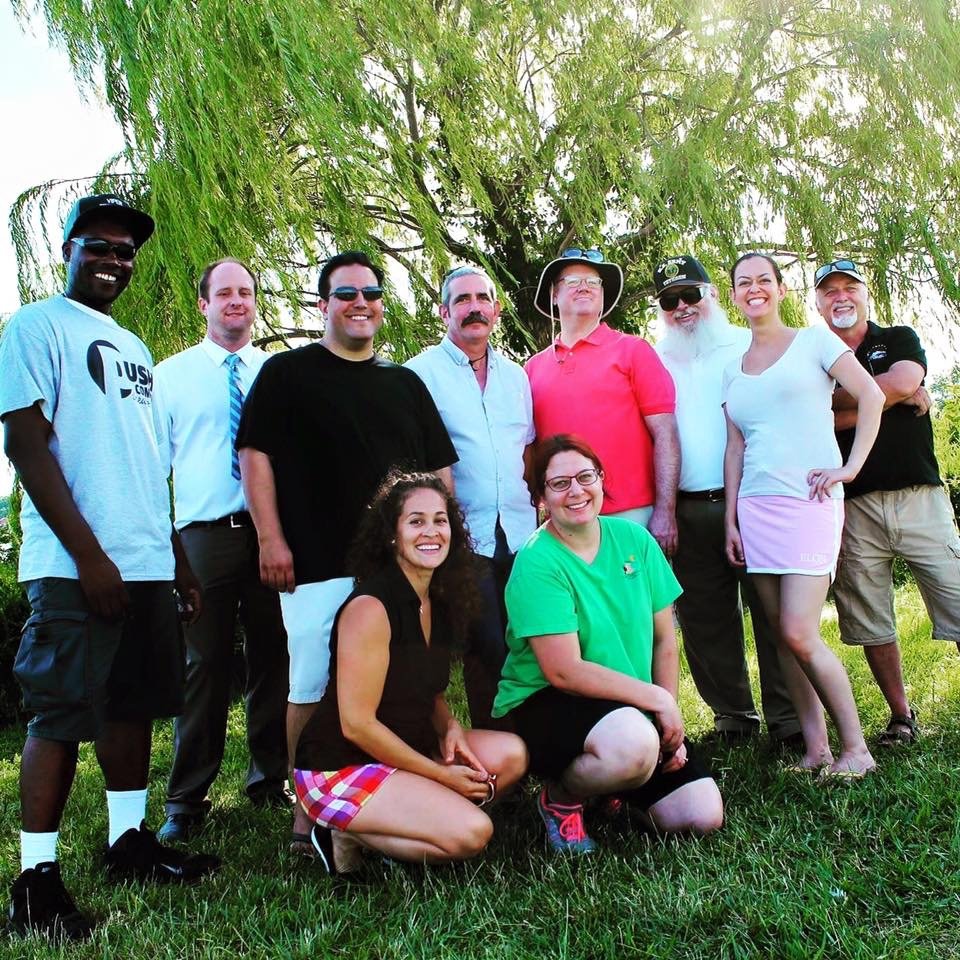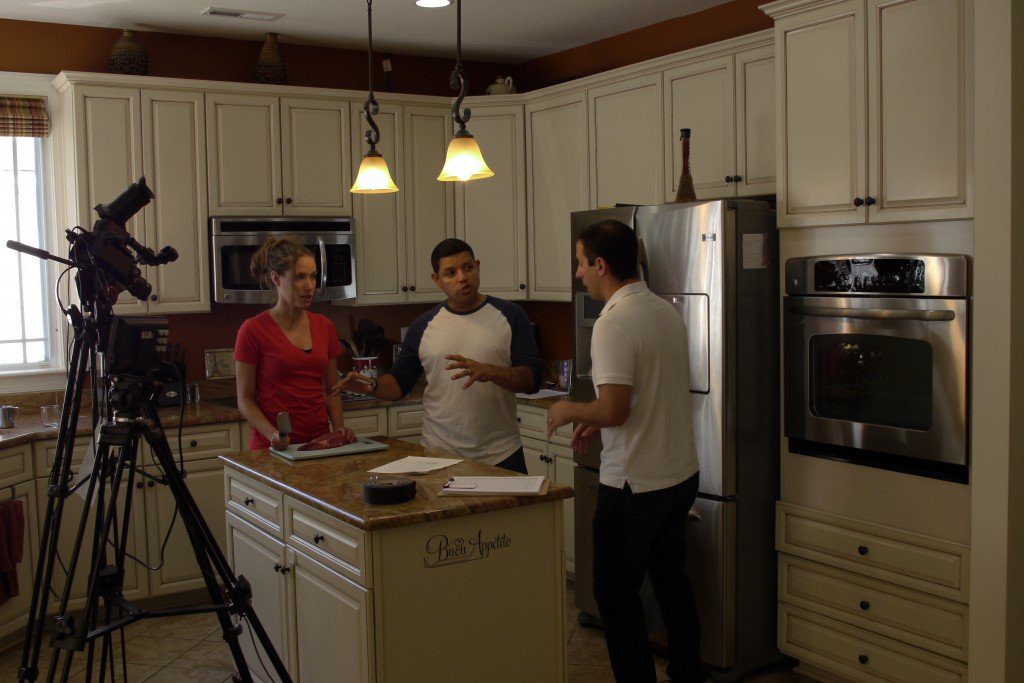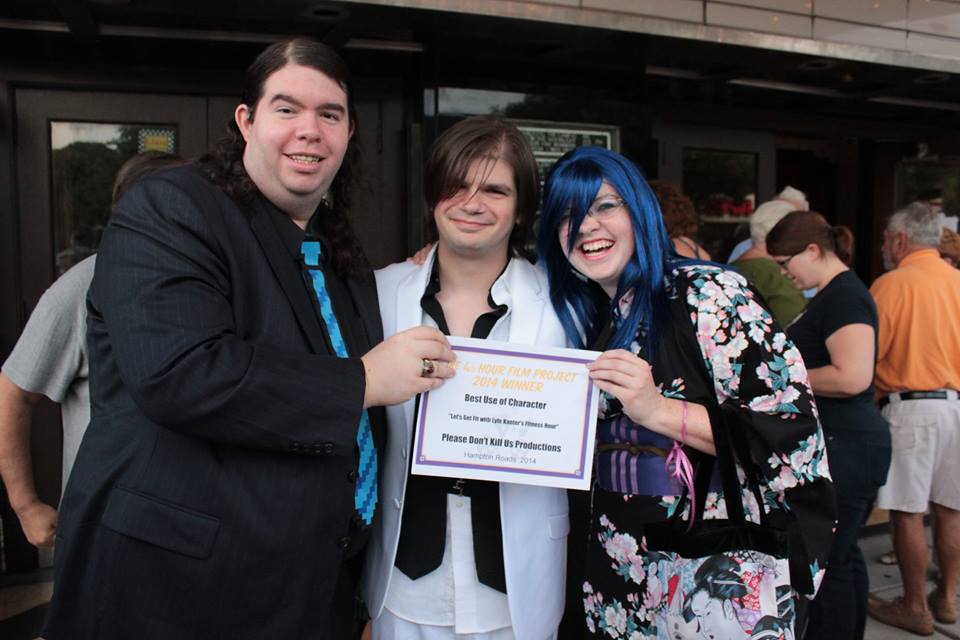
Guest Blog: An Inside Look At The Hampton Roads 48-Hour Film Project
| Blog, Feature, Film & Video
An Inside Look At The Hampton Roads 48 Hour Film Project
By Amy E. Mahon
Film racing is becoming more popular worldwide as filmmakers seek out their very own type of adrenaline rush. The 48-Hour Film Project was started in 2001 by Mark Ruppert and Liz Langston. The competition is held in various cities around the world. The winner of the Best Film for each city then receives a Filmapalooza Screening and additional prizes. Then the best film is chosen internationally. It could be a film from any city anywhere in the world.
In fact, in 2011 our very own Jpixx team’s film “In Captivity” won the world-wide grand prize at the 2011 International Filmapalooza.
And lucky for me, last year I was an intern at Jpixx while completing my second semester of graduate studies in screenwriting. And even luckier for me, this year I entered my fourth film racing contest and second 48 HFP contest with another former Jpixx intern, Chandler Perry, who was the director, director of photography, and lead editor for our film “Jerryatrics” submitted by Team No Time for Cameras. In addition to being an intern at Jpixx, Chandler has been producing fun short films in the area since 2010. In 2012 he began working in Norfolk for local artists and start-up companies creating music videos and advertisements. And he’s no novice when it comes to film racing – he has competed in multiple film festivals, earning national accolades for the TSA film competition and competing for the past 4 years at the Virginia Film Festival’s 72 Hour Adrenaline Film Project.
The way it works is simple – that’s pretty much the only simple part to this contest. On Friday night filmmakers are given the parameters in which they need to create their film – a required genre, prop, line of dialogue, and character. The genre is team-specific, while all the other elements aren’t.
This year our team No Time For Cameras received “Coming of Age” as our genre and the required prop, line of dialogue, and character were a glasses case, “Come on, tell the truth”, and Payne or Paige Sarmast (a tourist), respectively.
Our weekend started in the Generic Theatre (down under Chrysler Hall) where Jeannette Rainey, Producer, reviewed the rules and revealed the requirements. Jeannette started as a patron of the 48 HFP for two or three years when she heard a former City Producer was ready to step down but didn’t want to see this event absent from the community, so Jeannette stepped up! Of the teams she says, “One Friday night at 6:00pm they have no idea what they are going to create. But they commit to show it to the public no matter what. They do the best they can under the most challenging circumstances and they put their art out there as a celebration at the finish line.”
Once we did know, we were off to brainstorm and write! Sounds like the fun is about to begin, right? Well…yes and no. There is a lot of pressure to pump out a script by the end of the night to have in your cast and crew’s hands by early the next morning. Additionally, the contest starts on a Friday night after many teams’ members have already worked at a full-time job all week. For example, one of the members of our team, Joey Cathey, drove in from the D.C. area.
However, there are some competitors who love this aspect of the challenge. When asked what his favorite part of the 48 HFP is, JB Torres Medina of Snarly Beast Productions answers, “Getting into production, though brainstorming for a story was so much fun. My wife came up with the basic idea for the story. After that we (the crew) just started putting together different ideas and where to go with the story. After all the ideas, I was able to put together the meat of the story in a cohesive way. Of course making sure that it had the right elements for the story to make sense.”
As for Team No Time For Cameras, our film was about a man facing his signs of aging and how he deals with both the comical and heartwarming aspects of being “over the hill.” Once we had an idea the next question we asked ourselves was who would play the lead male – someone young and old enough to just start showing the signs of aging, but also has enough dramatic and comedic acting ability to play the role.
Enter Caswell Richardson, a criminal defense lawyer who is also involved in improv at the Push Comedy Theater in Norfolk . “I had heard about the 48 last year, and had been to see one of the screenings at the Naro. This year I wanted to be involved as an actor, but didn’t have a specific group to work with. Someone from the group that eventually became No Time for Cameras had asked me about being on that team, but I didn’t hear anything from them about this until right before the competition,” says Richardson. That “someone” was me, who called him around 12:30 a.m. on Saturday in a sing-songy voice cajoling him to be our leading man. In a sleepy voice that clearly indicated I had woken him from his slumber, he agreed. Then promptly rolled over and fell back asleep as I typed up a list of wardrobe items he needed to have as the crew members also prepared for the long day of shooting.
The next morning we didn’t really have a script together. I know, that sounds kind of crazy, but we had the layout of the story, the locations, and the motivations for the characters and objectives for each scene to push the story forward. Now all we needed were older men.
While I had a list of children ready in case we needed them, finding a very specific set of people – older men – can be harder to gather (when it usually is children, as parental permission is required, many families take advantage of a weekend getaway before school starts, or kids are still at sleep-away camps). In fact, casting and location are two major areas of production that can be problematic, and that’s why your team needs to plan ahead. Medina continues, “There are a few things that really drive the success to any team. First you have to have your location. I was almost down to the wire waiting for the location confirmation. With time, teams should have already scouted for locations and gotten their permits done before hand. It just helps. Having a location goes hand in hand with knowing how many actors you’ll have. It simplifies your writing process. I called some of the actors I’ve worked with before and thankfully they were all available.”
I second that. Last year I was on Team Seventh Point, which was the winner of multiple awards including Audience Choice and 1st Runner Up for Best Film. Because we were associated with a large company we had a large team going in with duties divided up. We met before the competition to bring together the lists of places we had permission to film at, which is why our film “Rerouting” had so many cool shots including inside a school, on a dock (and yacht), and at the Bier Garden in Portsmouth. I had also spent the weeks following up to the contest getting a list of potential actors for the weekend, along with others on the team, so we had a diverse and fun cast to work with.
Rerouting from Paul Costen on Vimeo.
By noon on Saturday I was shoving Pita Pit Caesar Wrap in my mouth and both receiving and making phone calls trying to get a cast together. Some of that was thanks to Jeannette Rainey. “I love being a facilitator, especially a facilitator of creativity. I’ve found the most rewarding parts of being City Producer are answering questions about the rules and regulations, helping team members find their inner organization, and, hopefully, motivating everyone to have a great time and be proud of all they achieve in the weekend of creativity and time constraint.” Jeannette provides teams with assistance as needed, and directs teams to a handy part of the Hampton Roads 48 HFP website which lists actors and crew members, as well as contact information, who are not on teams but would like to participate. Once she sent me to the site I was able to find all sorts of men who were willing to come on out and work with a team they’ve never met before. Says Chandler, “My favorite part of these competitions is meeting all of the new talent, this competition was no exception. Our actors were incredible and carried our script farther than I could have ever dreamed. It’s no over statement to say their performances and positive attitudes carried the film.”
Fortunately, we were able to find an incredible cast of men including Michael Boso, David Springstead, Sr., Mark Roehme, Jim Haney, and Anthony Threet. Our tourists were Rob Williams, who was a classmate of mine in the writing class Sketch 201 at the Push Comedy Theater, and Natalia Stuckey, who Cas had met in an acting class at The Actor’s Place in Virginia Beach. Our quirky doctor was Matt Cole, another regular at the Push. We were very lucky to have so many people ready to join us out at Mount Trashmore!
But that doesn’t mean the actual day of filming is a walk in the park. Ashley Hall of Team Skelly says, “The time restraint is always a challenge, and even when everything is going well and on time, the deadline is like this dark cloud looming over you. You hope that it doesn’t start raining, because if something goes wrong, that deadline will come and go and there is nothing you can do about. Regardless of how good you think your film is.”
“The most challenging thing about the 48 is getting something done that is good, coherent and hopefully technically sound. It’s difficult. I’m not sure we’ve ever nailed all three,” says Ernie Smith of Skelly Films of his previous experiences in the 48 Hour Film Project races.
Another area that can be challenging is working with new team members and having conflict on the set. Though most people try to avoid these, they do spring up. In almost every film contest I have ever done there has been some sort of conflict. Fortunately, it stems from wanting to do well.
At one point I was getting phone calls from potential actors, friends who had potential actors in mind and were calling for details, Chandler, and friends and family who forgot I was in the middle of a film race. As is my wont I started flipping out a little in the car on the way from one location to another. Caswell just listened and listened and listened until he finally gave me a look that made me realized I had been ranting for about 10 minutes straight. Which is something else I am wont to do. It was a look that reminded me that as stressed as I was he was just as stressed. Personalities clash. It takes a lot of patience to be part of this race. But it’s worth it. And so are the hugs team members give to each other when the stress is getting to them. David Springstead, Sr. gives some fantastic hugs. As a professional stage and screen actor who likes to remind me that he’s been doing this for a little longer than I’ve been alive, he’s great at giving professional encouragement while also staying neutral.
After filming in the hot sun and several takes, it was time to wrap the actors and begin the editing process before turning in the final product by Sunday at 7 p.m. at the drop off site. Jeannette, our sweet City Producer, had deodorant, sodas, and Pepto Bismol at the drop off. You know. In case the weekend shattered your blood sugar levels or digestive system.
Next comes the fun part – seeing the films! Since that epic weekend Caswell and I have hung out a few times and he’s mentioned how stoked he is to see himself on the big screen as a lead in a short, an opportunity that doesn’t come to many lawyers (unless you’re John Cleese or Gerard Butler). “I am super excited to see the films at the Naro. I have been going to the Naro since I was about eight years old, and the first movie I remember seeing at the Naro was Back to the Future. When I was a bit older, I started going to see the Rocky Horror Picture Show, and I’ve seen tons of movies there since. So it will be great to see it at the Naro, as it has a special place in my heart,” he says.
Rachel Bigelow of Team Skelly Films shares this same excitement. “It’s a joy to do this let alone have it shown on something other than a cracked phone screen.”
Once there the films are judged. Jeannette explains: “Ideally judges come from a diversified working background within the industry. For example, it’s ideal to have a director, a director of photography, an actor, a special effects or make up designer, a sound engineer, and/or a producer, etc. The emphasis, as much as possible, is put on getting judges that currently work in the industry.”
Categories judged include:
Best Film; 1st Runner Up – Best Film; 2nd Runner Up – Best Film; Best Directing; Best Writing; Best Editing; Best Actor; Best Actress; Best Ensemble; Best Cinematography; Best Sound Design; Best Use of Genre; Best Use of Character; Best Use of Prop; Best Use of Line of Dialogue; Best Graphics; Best Special Effects; Best Musical Score; Best Choreography; and Best Costumes.
Judges have the discretion to add or remove some categories, if they feel the years’ entries warrant it.
This year’s judges include:
Kathy Martin – Executive Producer, M2 Productions
Keith Flippen – SAG Actor, former 48HFP City Producer
Garney Johnson – Movie Aficionado
Scott Hansen – Owner, Digital Thunderdome Studios
Tymm Smith – Owner, No Sky Studios
Teviya Abrahams – Producer, Jpixx Films
In the end, I am happy to have been on Team No Time For Cameras with a fellow former intern and am so grateful for what I have learned from Jon and the rest of the folks at Jpixx. In fact, I am excited to return next year, and I’m not alone in this sentiment. When asked if they would do it again next year the responses were quite positive.

Rachel Bigelow: “Hell yea, because it’s the most fun you can have with no sleep in 48 hours.”
JB Torres Medina: “Most definitely! This project was a great challenge. It made our team come together. It really helped me hone in on what was important for the story.”
Caswell Richardson: “I would definitely do it again next year. I would enjoy the opportunity to meet and work with more talented people in the theater and film industry, and the opportunity to do more acting.”
Chandler Perry: “Yes. If anything, this year has gotten me even more excited to give it another shot next year!”
Ernie Smith: “That’s the question I ask myself every year. We probably will, but it’s not getting easier oddly enough.”
Ernie’s got a point. It is a rough weekend and you need to bring you’re a-game. That means planning, having plenty of food and water for your cast and crew (especially considering the sweltering conditions of filming outdoors), and knowing your equipment. But overall I think this year was a success.
We hope to see you at either of the Premier Screenings at the Naro Expanded Cinema (1507 Colley Avenue, Norfolk, VA 23517) for either Group A (Tue, Aug 25, 2015 at 8:00pm) or Group B (Thursday, Aug 27, 2015 at 8:00pm). Tickets are $9 for this event. The Best Of Screening is Saturday, August 29, 2015 at 5 p.m. and tickets are $7, also at the Naro Expanded Cinema.


